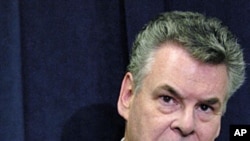The Republican chairman of the House Homeland Security Committee, Peter King, said the Iranian-backed militant group Hezbollah may have hundreds of operatives based in the United States, and he said Hezbollah, and not al-Qaida, poses the greatest terrorist threat to Americans. King held a hearing Wednesday with former government officials testifying.
House Homeland Security Committee Chairman Peter King of New York takes U.S. national security very seriously, and he says the terrorist threat to the United States may be shifting.
"Now, as Iran moves closer to nuclear weapons, and there is increasing concern over war between Iran and Israel, we must also focus on Iran's secret operatives and their number one terrorist proxy force, Hezbollah, which we know is in America," said King.
King said there are 84 Iranian diplomats in New York at the United Nations and in Washington, some of whom he said are likely to be spies.
One of the witnesses to the panel, Mitchell Silber, is the New York Police Department's director of intelligence analysis. He said since 2005, New York law enforcement officers have interviewed at least 13 people with ties to Iran's government who were seen taking pictures of New York City landmarks. Police consider the activity to be pre-operational surveillance.
Another one of the witnesses, former FBI official Chris Swecker, agreed that Hezbollah poses a real threat.
"While al-Qaida has gained attention and notoriety with a series of sensational attacks, Hezbollah has quietly and strategically operated below the radar screen by avoiding overt terrorist attacks in the U.S.," said Swecker. "But, nevertheless, Hezbollah is responsible for the deaths of hundreds of U.S. citizens, and including 241 Marines in the bombing of the Beirut barracks" [in 1983].
A former drug enforcement official, Michael Braun, said he fears the confluence of terrorist groups such as Hezbollah and global drug cartels. He said Hezbollah and members of the Iranian Revolutionary Guard are working with cartels.
"They are now operating and working in close proximity and collaborating with Mexican and Colombian drug trafficking cartels, not only in the Western Hemisphere, but other locations such as Guinea Bissau in West Africa," Braun said.
Several witnesses said Tehran may now be prepared to carry out proxy attacks on U.S. soil. They cited a failed plot, allegedly by Iran, to assassinate the Saudi ambassador to the U.S. last October in a Washington restaurant.
The ranking member on the committee, Democrat Bennie Thompson of Mississippi, urged caution, especially addressing those lawmakers who are calling for tougher action on Iran's nuclear program. He said, "But we should not engage in a public discussion that creates fear and delivers misinformation."
Thompson said if lawmakers have concerns about Iran, they should invite National Intelligence Director James Clapper to testify in front of them in a classified setting.
| Join the conversation on our social journalism site - Middle East Voices. Follow our Middle East reports on Twitter and discuss them on our Facebook page. |




